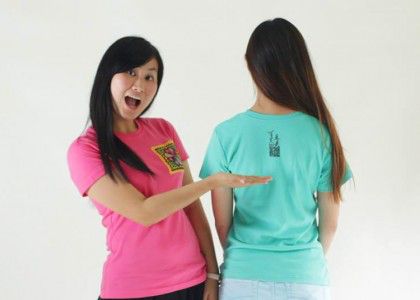
In an attempt to advocate for the welfare of young and impoverished Chinese girls, a Boston University student and her is selling t-shirts and donating the proceeds toward promoting growth and education for these girls in need.
Chenxi Ouyang, co-founder of the Bright and Beautiful Girl Project , said she and her partner Juliet Zheng, a senior studying business at a Chinese university, came up with the idea for the initiative when pitching a project for the Unreasonable Institute, an organization that provides support for entrepreneurs posing solutions to social and environmental issues.
“Me and my friend Juliet pitched the original idea about documentaries about girls in underprivileged areas, and having them put their handiwork on a shirt,” Ouyang, a College of Arts and Sciences and College of Communication senior, said. “We’d put a QR code on the back of the shirt, and when people buy the shirt, they’d scan the code and see the documentary about the girl. That was the original idea.”
Ouyang said she first became involved in activist efforts when she participated in the Unreasonable Institutes’ experiment program, Unreasonable at Sea, in partnership with the travel program Semester at Sea, that took place from January to April 2013. Participants traveled to 13 countries, including China, to witness and address social and environmental issues.
While traveling with Unreasonable at Sea, Ouyang worked with the film crew, where she met Zheng. Sharing an interest in social activism, both decided to take action by participating in the pitch contest held by the Unreasonable Institute, Ouyang said.
Ouyang said she visited a Chinese province with Sheng over the summer where they followed a group of young girls in the area. Footage of one of the girls is linked to the t-shirts’ QR codes.
“We came up with the idea, and we want to base the idea in China,” she said. “This summer, we went to China in a little province called Yunan, and we documented a group of girls who work in an embroidering factory.”
The Bright and Beautiful Girl Project aims to have a positive impact not only on girls in rural China, but entire communities that would also benefit from the inclusion of girls in education and work, she said.
“We chose to focus on girls because if you help a girl you can influence a generation — the generation above, such as influencing husbands and children,” she said. “If you can change a girl’s life, you can change a lot of things.”
Work from other groups has served as a source of inspiration for her activism, Ouyang said. The Nike Foundation’s partnership with Girl Affect, a movement that advocates for the education and welfare of young girls, and PBS’s documentary series “Half the Sky,” which follows activists through 10 countries as they document the stories and struggles of women worldwide, have helped define her focus.
Ouyang has introduced the Bright and Beautiful Girl Project BU, a group which has gained members and written postcards to the girls working in embroidery factories in China. The group plans to continue spreading awareness about the cause and further test and develop the t-shirt prototype, Ouyang said.
This winter, Ouyang said she will be revisiting China with Zheng in order to see how to best use and distribute the funds to the girls in the documentary.
CAS professor Joseph Fewsmith, who teaches in the international relations department, said China could benefit from smaller-scale humanitarian and social projects such as the Bright and Beautiful Girl Project.
“I don’t see how China wouldn’t be open to humanitarian efforts,” he said. “There’s always room for cooperation.”
College of General Studies professor of social science June Grasso said efforts to improve the education and opportunities available to impoverished women are helpful to the Chinese community.
“Rural women in China tend to be poorer than those from urban areas,” Grasso said in an email. “They are often less educated and have fewer opportunities … Anything that assists with jobs, education, and other ways to encourage financial well-being would be beneficial.”
























































































































Claire S • Dec 6, 2013 at 1:52 pm
Correction: The Nike Foundation’s “The Girl Effect” not Affect!
website here–> http://www.girleffect.org